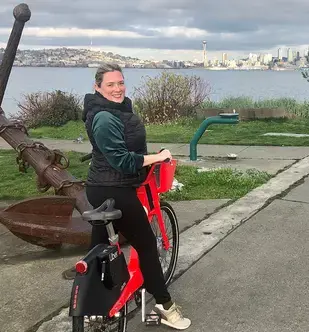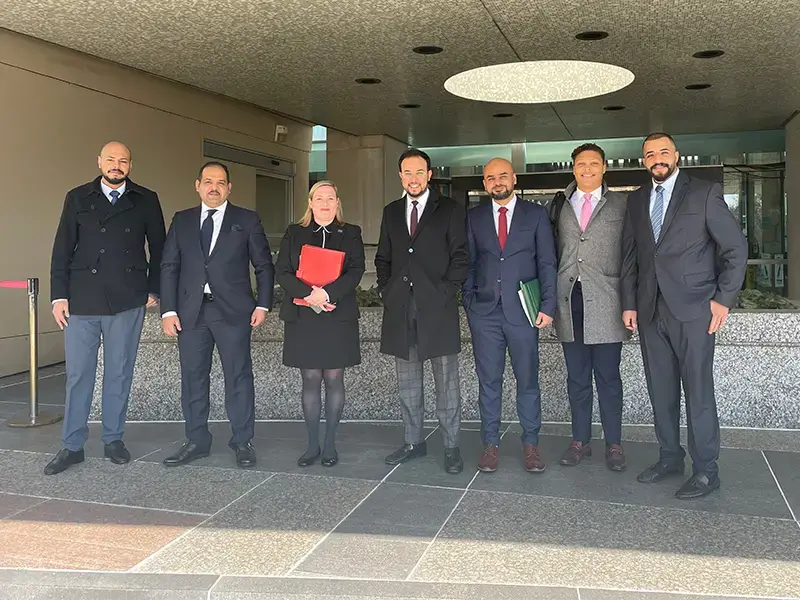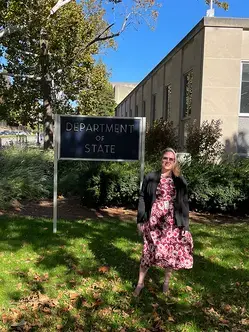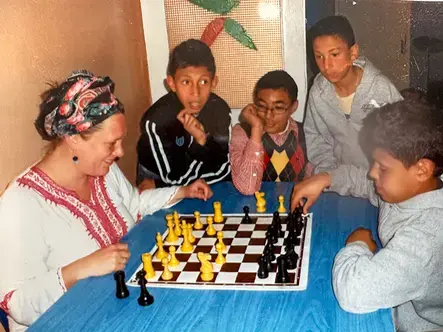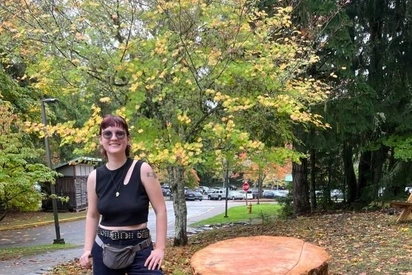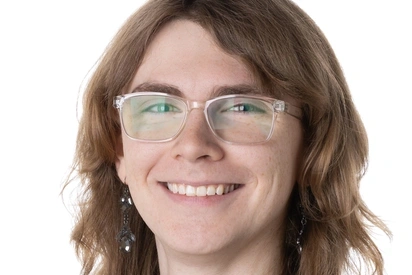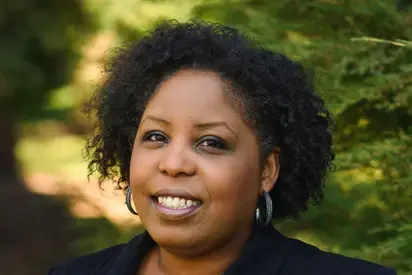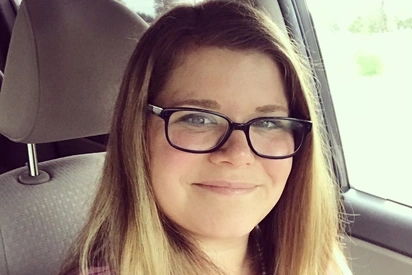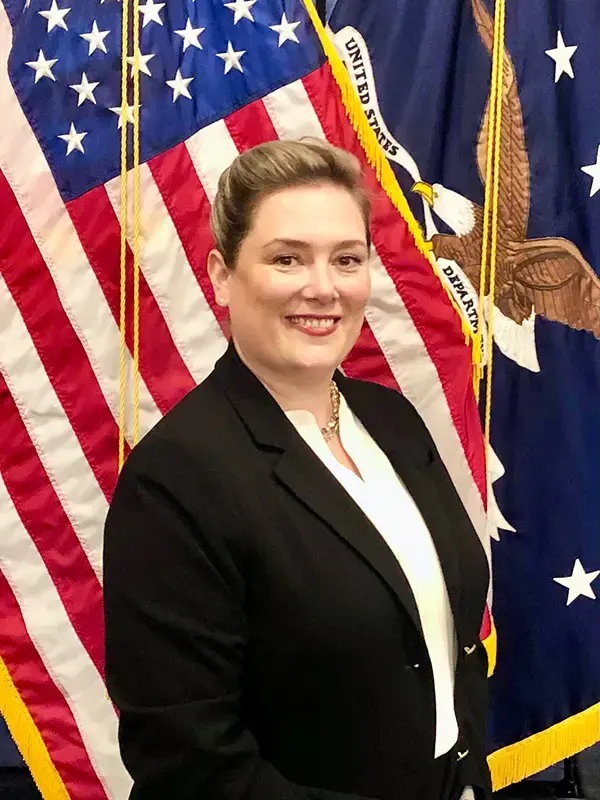
We invite you to join us as we sit down with public servant, human rights advocate, and world traveler, Christine M. Carlson, to learn more about her journey at Evergreen and her work as a Foreign Affairs Officer and Policy Advisor for the Strategic Religious Engagement Unit (SRE) in the United States Department of State’s Office of International Religious Freedom. Alumni Programs is denoted as AP and Christine Carlson is denoted as CC in this interview.
AP: Tell us about yourself, who is Christine Carlson?
CC: I am currently a Foreign Affairs Officer and Policy Advisor at the United States Department of State, specifically in the Human Rights division. For the past two years, I’ve worked in the office of International Religious Freedom as part of the Strategic Religious Engagement Unit. By way of giving an example of what I work on, today I drafted a speech for our Deputy to the Ambassador of International Religious Freedom that she’ll be delivering to the Jain community from the DC area and dignitaries traveling from India. In this instance I “held the pen,” as we say at the State Department, though I work with many colleagues as part of a consensus-based process. Prior to this position, I worked for the United States Department of Labor on projects and policy to end Human Trafficking. I sought every avenue to end child labor and to find ways to work with global civil society and foreign governments.
Just prior to this, I served as a United States Peace Corps Volunteer in Morocco from 2011-2013 while earning my master's degree from The Middlebury Institute of International Studies at Monterey (MIIS). During that period, I authored my thesis on the experience of Muslim sex workers with a focus on public health and HIV/AIDS awareness. I am deeply grateful to the women and men who trusted me with their stories; what they shared was often unexpected, there was sorrow but also, joy.
Now to Evergreen! Evergreen is great because it challenges students to open their minds, and to pursue their convictions. On the other hand, I was a bit nervous about finding a job after graduation. I chose the MediaWorks program for my last year because I loved film, dance, and performance, and French. MediaWorks seemed to provide a way to produce something creatively and give me tools to build a purposeful career. It worked! Directly after graduation, I interned for the documentary producer, John de Graaf, out of the PBS affiliated KCTS channel in Seattle. I worked there and, on several projects, from producing for Bill Nye the Science Guy to MTV reality TV programs. Unfortunately, the elements that would eventually lead to the #MeToo movement were part of my experience. I shifted gears and joined the policy office for Planned Parenthood of the Greater Northwest. As a field organizer I was proud that my work helped support women’s rights and led to concrete legislation that set standards in Washington State schools for sexual health education.
Deeper, on my background… My parents met at an Evangelical commune in Portland, Oregon. Though their core was different, perhaps their love was founded in service to others. Ultimately, their parting led to my sister and I to constantly move between and to engage with quite different perspectives. Amidst the chaos, my 9th grade French teacher showed me another world and ignited a dream. This dream was furthered when I had the privilege of taking Evergreen’s advanced interdisciplinary program, Sacred Monsters: Insiders and Outsiders of French Speaking Culture for The Last 400 Years. That course framed my whole education and framed most of my career.
AP: What brought you to Evergreen?
CC: What brought me to Evergreen is what brings most students to Evergreen. I think going back and forth between conservative and liberal places, and coming from a sort of disparate background, I needed to be in a place where my need to question everything was accepted and celebrated. Also at the time, my Dad was working as a social worker for Washington State helping unhoused individuals with severe mental illness, and so I received a tuition waiver that I hadn’t applied for or expected.
AP: Were there any classes or faculty that inspired you while at Evergreen?
CC: The classes that still stick with me are MediaWorks, Sacred Monsters, and a Sailing Literature program. Though this last course may seem out of place, maritime history is the history of the world and commerce up until the last century. The practical aspects of navigating waters have also been immensely helpful throughout my career. While reading maritime stories and poetry, we learned they translate to many cultures around the globe. When you are engaging with diverse cultures, understanding the literature, and underlying values of that culture is always helpful.
One professor in particular, Thad Curtz, taught me that communication is about finding a way to ensure that how you are communicating is delivered in a manner that your audience can understand; that they are in communication with you.
This theme pervaded my education at Evergreen. In my pursuit to speak French, I had the opportunity to have another inspiring language teacher who gave me the best advice – she told me to forget the grammar and focus on the music of French. In her words that stay with me, “Il ne faut jamais oublier la musicalité de la langue française.”
AP: Can you tell us more about your work as a Foreign Affairs Officer with the U.S. Department of State’s Strategic Religious Engagement Unit, covering the NEA and SCA regions?
CC: So, I am a civil servant, which comes with a lot of privileges and benefits. I have great retirement, great healthcare, tenure, and I am represented by a union, sort of (that is another conversation!) ... I am humbled that the U.S. people have put confidence in me to pursue their interests, and I don’t take that lightly. I work hard to serve.
First, in my role with The Strategic Religious Engagement Unit, foremost we deeply respect the establishment clause of the U.S. Constitution and are never pushing faith-based ideas or practices onto any organization. The purpose of our work is to cultivate relationships with religious actors because they are often civil society’s most important leaders with the ability to speak deeply into a community. The significance of their representation in the crafting of policy has sometimes been overlooked, but their narrative is essential for any policy discussion. Recently, I coordinated an event with Dr. Rev. Gary Mason on the Good Friday Peace Process and conflict resolution, in March with Bill McKibben, on faith and tackling the climate crisis, and in June, with Father Bryan Massingale, an African American, openly gay priest, who spoke about foreign policy and LGBTQI+ human rights concerns around the globe.
AP: What does Equality mean to you?
CC: It is everything. You are constantly thinking: Okay, I have this policy goal and I want the best of all backgrounds that represent all the United States to be part of this dialogue, so that we are serving the United States in the best way. We do our job so much better when we have people from different schools, when we have people of different ages, gender identities, sexualities, races, and especially different classes, so that everyone is better understood and so we can remain truly informed. That has always been my understanding of equality in the work of foreign policy.
AP: What challenges have you had to overcome working for the U.S. Department of State and within your specific unit of Strategic Religious Engagement?
CC: Hmm, well in general in my foreign policy work, I do not work with enough people who have a West Coast attitude, by that I mean more willing to question any and everything. Since I was raised to ask questions and read as much as I could, it is sometimes tough to hold space with the East coast elites. Sometimes, I feel I will say something that gives me away and risk not being listened to. I often find myself debating whether I should conform to what is expected or stick true to my experiences and knowledge.
It is also physically challenging work to get to a place where you can do this work with any kind of insight. Between the Peace Corps, where I was often sick, or stunned by the reality of the suffering I have seen here, the toll of looking at the worst of humanity has impacted me in many ways. When you spend so many years of your consciousness on these terrible stories, invest your mind and body; there is a toll, nothing compared to the suffering you see, but it is there. It is challenging work. You must have spiritual, mental, and physical fortitude.
AP: Who opened doors for you?
CC: John De Graaf, the documentary film maker who I mentioned earlier, really believed in me, giving me the opportunity to work on documentaries concerning labor rights and environmental issues.
Another Evergreen alumni, Kristen Glundberg-Prosser always believed in me and gave me opportunities to serve. She along with Jennifer Allen, also a Greener worked with me as a field organizer for Planned Parenthood and we have remained close over the years. Sadly, the last time we were together was on the steps of the Supreme Court when Roe v. Wade was overturned. We hugged, and cried, and held up our signs in anguish. I constantly relent about what we are doing wrong in the movement for reproductive rights. She has held on. She is a true hero for women. Now she is the CEO of Planned Parenthood of the Great Northwest, Hawai’i, Alaska, Indiana, and Kentucky, and her ability to stick to her values has always inspired me.
AP: What impact do you hope to make through your work?
CC: To elevate the human condition. That is my existential call in my work, and I feel so privileged to have the capacity to cultivate that awareness. I hope to bring love to all my interactions. I really do believe in the mission statement of my unit- I think it is important that people understand different religious perspectives and that we have real relationships with religious actors.
AP: What advice would you give current students studying at Evergreen today who will join you as alumni?
CC: I wish I trusted the academic process of Evergreen and taken a foundational course. For my first program, I requested a course waiver and took a junior level French literature, which I consider to be one of my strengths but there were times when I felt a bit lost. I lost the opportunity to connect with my fellow first-year students who were in those courses gaging their baseline knowledge and experiences through an interdisciplinary lens. I encourage all students to take the time to explore and learn and get into the process and read and do weird things, while also taking advantage of our world-class art and science facilities. Be concerned with practical matters, but do not let it paralyze you from community, and build meaningful relationships with your peers and your faculty.
AP: What is your superpower?
CC: I want it to be my ability to love; I strive for that, in all its ways. Love is accepting, not simply understanding. To love is to know oneself and the capacity which you can give to another person or situation. I think love is about sustaining commitment to one’s existential belief: it is patient and kind to the giver and receiver, and I hope I can embody that.
Biography: Christine M. Carlson (she/her/hers)
Christine M. Carlson has served as a U.S. Government public servant in foreign policy for over a decade. Currently, she serves as a Foreign Affairs Officer and Policy Advisor for the Strategic Religious Engagement Unit (SRE) in the United States Department of State’s Office of International Religious Freedom. Previously, she served for eight years as a Senior International Relations Officer at the U.S. Department of Labor’s International Labor Affairs Bureau where she designed programs that helped rescue over 30,000 children from exploitative child labor in Morocco, Jordan, Egypt, Lebanon, Bangladesh, and Nepal. Before her work in foreign policy, she worked in public policy for Planned Parenthood Northwest headquarters in Seattle and in TV/Film production. A graduate of Evergreen State College in Olympia, Washington, she later earned an MA in International Policy and Management from the Middlebury Institute of International Studies at Monterey. Christine is a Returned United States Peace Corps Volunteer - Morocco 2011-2013.
Christine Carlson notes that her remarks reflect her personal experience and opinions and do not express an official commentary by the United States Department of State.
